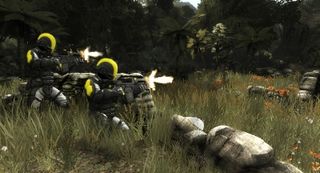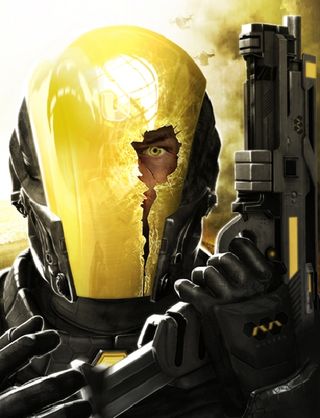In the mid-21st century, corporations dominate the world and none is bigger than Mantel, the bio-medical giant. Its armies have replaced the UN and NATO, and the stimulant drug it develops - NECTAR - fuels its elite soldiers, who are deployed to tackle rebels in the jungles of South America. This is the world of Haze, a hotly anticipated first-person action game for the PS3.
Set over three days in 2048, the game will cast you as Sergeant Shane Carpenter, who will come to realise that his perception is being manipulated by NECTAR and not all is as it seems in the world governed by Mantel.

Intended as a serious satire of videogame conventions as well as a sci-fi adventure, Haze is being created by Free Radical Design, the makers of TimeSplitters. SFX spoke to Derek Littlewood, Creative Director, about the SF storytelling elements of the project.
SFX: What will make Haze different from other first-person shooters?
[Derek Littlewood] "The fact that it has something to say about the depiction of war in videogames, and that it does this not just through the narrative but through the gameplay too."
SFX: So how will you balance writing a compelling story with creating an innovative game?
[DL] "Narrative and gameplay should reinforce and support one another. When we started making Haze, we first asked what message we wanted to communicate to the player, and then how the player's experiences as they play the game would communicate that message. We then developed a more detailed plot and set of mechanics that would support that message."
"For instance, one of the plot threads in the game concerns the Mantel soldiers' addiction to NECTAR. By giving the player the ability to use NECTAR early in the game, and not only to use it, but a whole host of cool benefits so that they're not able to stop using it, they're uniquely able to appreciate just how addictive nectar is because they've been addicted to it themselves. And I think the key to why Haze is so unique is that NECTAR isn't just a performance enhancer. It gives you some cool abilities but it has a flip side – use too much of it and you'll overdose, turning you into a lethal, bullet-spraying maniac who's unable to tell friend from foe and will shoot both given the chance."
"It also has another purpose that's integral to the narrative – it censors and sanitises a Mantel soldier's view of the world, hiding the full horror of the situation they're in. This develops for the player until they reach a point where they actually change sides, and then you're fighting for the rebels, using NECTAR against the Mantel troopers who were formerly your allies. And that's another very cool thing about the game – it's almost two games in one, with you getting to fight on both sides of the same war."
Sign up to the SFX Newsletter
Get sneak previews, exclusive competitions and details of special events each month!
SFX: Did you always want to provide a distinct moral message about drug use or was it something that came to the surface during production?
[DL] "The core message of the game isn't about drugs at all – it's about the depiction of war in videogames. NECTAR was developed to enable us to communicate that message rather than because we explicitly wanted to communicate a message about drug use. The fact that the player experiences side effects of the NECTAR was always designed to serve the main message rather than a message about drugs, so I have to confess the moral message about drug use is in many ways a convenient coincidence rather than being something we intended all along."

SFX: The science-fiction genre crosses over every platform imaginable, was the production of Haze influenced by any other well known cult classics?
[DL] "It is quite a melting pot, to be honest. The very first influence was actually Apocalypse Now (er, which isn't science fiction at all, I'll admit, but bear with me...), as we wanted to create a game that was a story set IN a war rather than a story ABOUT a war, which is what games traditionally do. And along the way there's definite influences from films like The Matrix and Starship Troopers. There's also a fair few gaming influences in there – our writer, Rob Yescombe, admits to being highly influenced by Hideo Kojima's work with the Metal Gear Solid games, and games like Half Life and Halo have also had a bearing on the game's direction."
SFX: And what makes your vision of the future in Haze unique?
[DL] "I think the fact that we're exploring these issues in a videogame is one of the most unique things about it; I love the increased sense of complicity that the player gets in a game in comparison to more passive media like film or TV. What I mean by that is, for instance, in a TV show, when you see the protagonist shooting someone, you're always in that privileged position of being able to go 'Well, I wouldn't have done that'. In a game though, it isn't some protagonist who's done the shooting – it's you. And that increased sense of complicity, and responsibility for events that follow is something that games are uniquely empowered to explore, even if they traditionally haven't really done so."
"Also, even though it's not really unique in the context of cinema, TV or literature, I'm also proud that Haze presents war as being something more complex than 'These are the good guys, those are the bad guys – you should kill all of them', as many games, even today, tend to do."
SFX: Haze is the latest of many science-fiction and action games to make use of a complex, film-style narrative. Do you feel that such a shift in the focus of games gives fans of more traditional entertainment forms a reason to become interested in games?
[DL] "Barring a few notable examples, the narrative content of games has long lagged behind their rate of technical advancement, resulting in the slightly embarrassing situation where you can have a game with film-quality production values and near-lifelike visuals but a narrative, dialogue and characterisation that a straight-to-DVD movie would be ashamed of. Fortunately this situation is changing, with a lot of developers now employing professional screenwriters (such as our own Rob Yescombe), and I think that the stories that games are trying to tell, and the way they tell them, are increasing in quality at an enormous rate. There is a good argument for fans of science fiction TV and film checking out a game like Haze – I think they'll be pleasantly surprised."
SFX: What is the team's favourite sci-fi show?
[DL] "I'm going to make an executive decision and say Firefly. Joss Whedon's characterisation is just wonderful, I can't think of any other writer who has created so many characters I empathise and relate to."
SFX: Being a British based studio, do you find that the games sentiments or presentation have a ‘British’ feel to them?
[DL] "I think our humour is quite British. This was definitely at its most evident in the TimeSplitters games (who else would decide an Elvis impersonator or a man in a lion suit would be good characters to have?) but it's still definitely there in Haze, albeit in a darker form - for instance, in the black comedy of troopers overdosing on NECTAR."

SFX: Haze has been seen as being a possible rival to Halo 3, is this how you see it and if so how confident are you?
[DL] "Halo 3 is a complete juggernaut, so your question is a bit like asking a filmmaker what it feels like to go up against Star Wars or Indiana Jones! I'd rather not! Halo 3 is going to be huge and we're not under any illusions that we're going to be able to do a damn thing about that. But that said, we're not unaware of our strengths. Halo 3 is certain to provide players with a truly epic narrative but Haze is much more personal – a much more human story, I think. It's not about the future of an entire civilisation, it's about one man's journey through a war, and his changing perceptions of it, and that definitely has a unique appeal all of it's own."
Haze will be published by Ubisoft in November 2007, with only a PS3 version confirmed. Visit the official Haze site for more information. There is also a Mantel website , for those who want the full immersive experience. (Questions by Tim Coutts).
SFX Magazine is the world's number one sci-fi, fantasy, and horror magazine published by Future PLC. Established in 1995, SFX Magazine prides itself on writing for its fans, welcoming geeks, collectors, and aficionados into its readership for over 25 years. Covering films, TV shows, books, comics, games, merch, and more, SFX Magazine is published every month. If you love it, chances are we do too and you'll find it in SFX.
Most Popular




